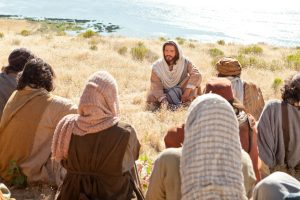and your ‘No’ mean ‘No’.
We live in the age of the ‘sound bite’, the ‘tweet’, the ‘instant message’. Our willingness to eschew greater understanding and deeper knowledge for instantaneous gratification are stark reminders of our growing acceptance and decline into mediocrity and mindlessness. We are in danger of losing ourselves and our souls in the vacuousness of non-thinking. Rene’ Descartes’ philosophical proposition ‘cogito ergo sum’ or ‘I think, therefore I am’ is fast becoming ‘cogito non ergo sum non’ or ‘I think not, therefore I am not.’

The Sermon on the Mount
Recently, a journalist asked several demonstrators whether they believed that a specific political group was racist. Everyone interviewed responded ‘yes’ without any hesitation, but when asked to relate one specific instance of the targeted group’s racism, there was deafening silence. No one could cite a single instance. They were absolutely sure of their convictions because that was what their signs and slogans, their ‘sound bites’, told them; beyond that was uncharted territory, completely unknown and irrelevant.
So it as well when we hear Jesus teach us with the Sermon on the Mount. What we hear, all that we recognize and remember is the Beatitudes [Mt 5:3:10] and to be honest, we remember them only too poorly. The travesty is that we too often ignore or dismiss the remainder of the sermon, which is contained in the whole of chapters five, six, and seven. We live by ‘sound bites’ and cannot be bothered with the details.
It is a truth that we live in an ‘interpretative’ age, where words are nuanced and what is said is not always what is meant or intended; perhaps best described with the statement “It depends on what the meaning of the word ‘is’ is” infamously argued by former President Bill Clinton. We have forgotten, or perhaps we have never read the entire Sermon on the Mount and thus have not discovered Jesus telling us to “Let your ‘Yes’ mean ‘Yes’, and your ‘No’ mean ‘No’. Anything more is from the evil one” Mt 5:37].
Poll after poll indicates that virtually everyone distrusts government and politicians, whether they are local, state, or federal, irrespective of party affiliation. The root cause of this distrust can be distilled into the simple fact that the truth has so often been stretched, distorted, and bent until ‘Yes’ means ‘No’ and ‘No’ means ‘Yes’. As Bishop Emil Wecla puts it “Untrue and careless language wipes out trust.”
We are born into a life full of choices and are free to choose from a cornucopia of options, some good and others bad. Our choices determine who we are and who we will become, but it is equally true that those choices inevitably and inexorably alter the lives and choices of those with whom we live and interact. God gives us free will but he desires that we exercise His gift wisely, predicated on what is right in and of itself. To choose rightly requires us to fully understand all of the ramifications of our choices and to cogently measure the goodness of our intentions and our actions.
We become what we choose and our choices reveal who we are becoming. Choices that reflect the love of God, words and actions that tell others you are the light of Christ, dispel the darkness and will change the world for good.
